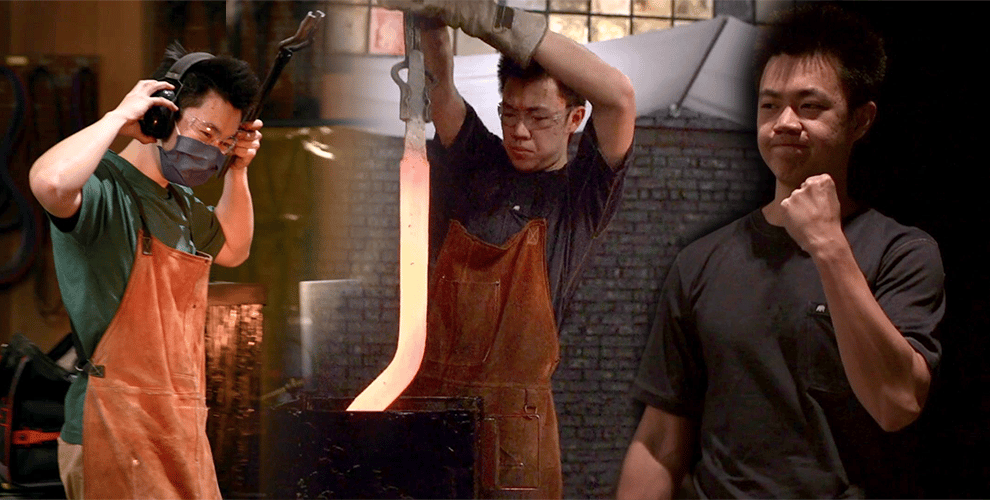At BASIS Charter Schools we are used to having extremely successful students, however it never fails to delight us when alumni start to make waves. That is exactly the case of Jesse Hu, alumnus of BASIS Chandler, who recently participated in, and won, the History Channel’s season 9 “Forged in Fire” weapon-making contest.
Nineteen-year-old Hu battled blacksmiths, some more than twice his age, to win over the judges with his exemplary craftsmanship and creativity.
Regina Gardner, Local Marketing Specialist, and Phil Handler, Vice President of Communications and Brand Management, had the opportunity to speak with Hu about the show, his craft, and his years at BASIS Chandler.
Thank you for taking the time to speak with us! How did you hear about the show?
Hu: I have known about the show for quite a while, but last year, I was at Bed Bath and Beyond buying college supplies when I got a direct message on Instagram that was like ‘Yo, your page looks really cool, do you want to try auditioning and interviewing for a spot on our ninth season?’ After I got that call, I was doing interviews over Skype, first time I ever used Skype in my life (laughs). I was talking to them through email, phone, text, and Skype for a couple of months, but I didn’t know what I was going to be doing. At some point they gave me the option of doing the four-person show like the ‘Chopped’ format or an experimental new segment called the ‘Gladiators of the Forge.’ I talked to my parents and eventually decided on the one-on-ones [‘Gladiators of the Forge’] because ‘go big or go home’ (laughs).
So, there wasn’t a formal application process or audition that you had to do? Or did they just want you on the show?
Hu: All of this was framed as an application/interview thing. I didn’t know if I was going to be on it or not. They interview people and then pick and choose. I have people in my blacksmithing circle who have been asked to do interviews, and then they were never talked to again. They didn’t make the cut or something.
How long did you have to wait before you knew that you were going to be on the show?
Hu: All of these interviews began in late August/early September. I was sort of in the dark about when and where, but I knew I was eventually going to be on the show.
Were you able to do anything to prepare? Did you do anything to prepare for it?
Hu: I did a few things. The show is known for doing a lot of Damascus and pattern welding, but because my shop at home was slightly under tooled, I didn’t have access to the right materials and tools. At this point I am in Michigan now and in a blacksmithing club. There’s an instructor there that I work with, and he has experience making Damascus. I hit him up and asked him to teach me. He gave me a crash course, and I basically learned it in a day or two. I also watched a lot of ‘Forged in Fire.’ Even during the filming, I was watching it. Aside from that I honed my fundamentals by teaching new members basic forging techniques, reading blacksmithing forums, and watching a lot of YouTube videos.
I looked on your website and got the gist of how you got started forging your future, but could you elaborate?
Hu: I say on my website, and on the show, that I got into it by watching YouTube and being bored. I remember seeing a thumbnail on YouTube of someone forging and thinking that is super cool. I also thought to myself you don’t need that much stuff to start, so I went with my dad to Home Depot got some bricks and some charcoal. I went home and built a tiny forge with a hairdryer. It worked terribly, but I got to hit some steel. I did that on and off 3 or 4 times a year for 3 years so I wouldn’t say that I started in 8th grade because I didn’t do or make anything. In 11th grade I invested more time and money, well not my money, my parents’ money (laughs). They were happy to put money in to get me started.
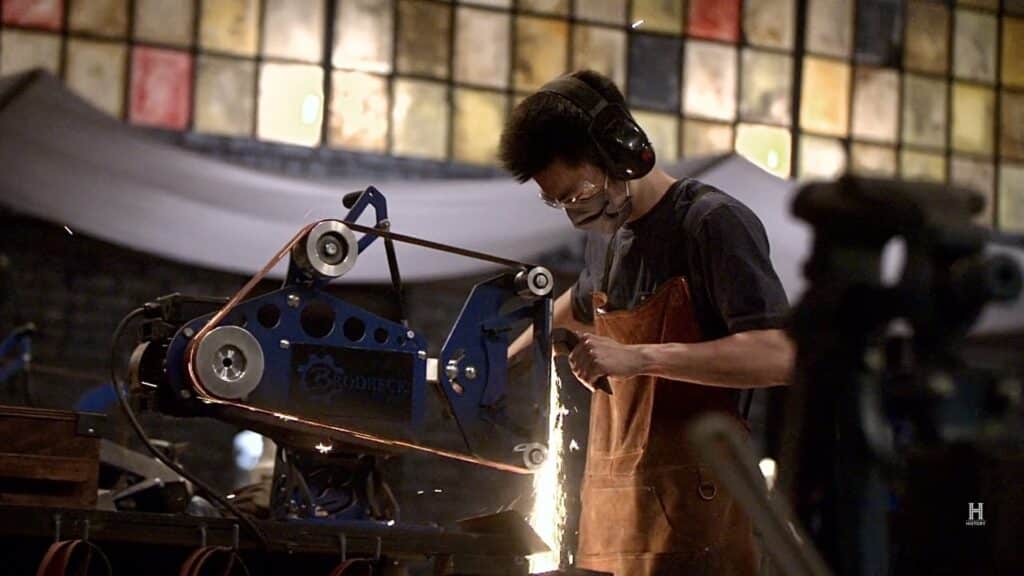
What was your favorite experience on the show?
Hu: I think the greatest experience was at the very end of the filming. During there were so many COVID protocols, and I could never talk to the judges. When the entire gladiator segment was over, I got to meet and talk with them for about half an hour. That was super cool. When I went back to the hotel the crew asked me to go get dinner with them at a bar, which they have never done before. I am the first person in ‘Forged in Fire’ history to get dinner with the crew. The thing that made it the coolest was that they treated me like an actual adult as opposed to looking down on me like I was some kid.
I know that you weren’t able to tell anyone that you were going to be on the show for quite some time. How did that feel for you having to keep it all to yourself?
Hu: Obviously, it was kinda tough. It’s like if I was in some fictional world and I was a superhero, but I couldn’t tell anyone. I told a few close friends and obviously my entire family knew, but I told them to keep it a secret. I was scrolling through Wikipedia because they have a list that goes four episodes in advance, and I saw four weeks before I got the email that my episode was going to be airing. That made it even worse, because I knew exactly when it was going to air, but I couldn’t tell anybody. But when it came out it was a lot more exciting.
Did you get to keep any of the weapons that you forged on the show?
Hu: So, the thing about keeping weapons on the show is that you can only decide to keep them if you lose. But I won all my battles, so I was never given the opportunity to keep them. They are probably sitting in some executive’s office in a glass box or hanging on the wall in the filming location.
Would you remake them at some point in time? Do you have any desire to continue that kind of process? Those type of weapons?
Hu: There are two circumstances where that would be possible. Number one is I try to build it again in eight hours and see how different it can be with tools I know how to use. I don’t really know if I want to do that. A time limit is not a good thing! I wouldn’t want to put something out there that isn’t the best I could make. If I wanted to make a good one with ornamentation, perfect grinds and finish, that would be okay, but I wouldn’t do it free (laughs). I would have someone commission it and then build it.
That makes sense. Since you only had eight hours to completely forge a weapon did you feel a lot of pressure?
Hu: I kind of enjoyed it. I have grown up in a competitive environment, and BASIS for 8 years (laughs), so I have known time crunches my whole life. I knew how to play with the time that I was given. I said this on the show, but I really liked picking super difficult things. I knew I could find a way to deal with it [the difficulty and time limit], but I didn’t know if my opponent could. (laughs). That sounds kind of mean, but it was a little bit funny.
It’s a competition. You are giving yourself the extra edge you needed to win, and you did win!
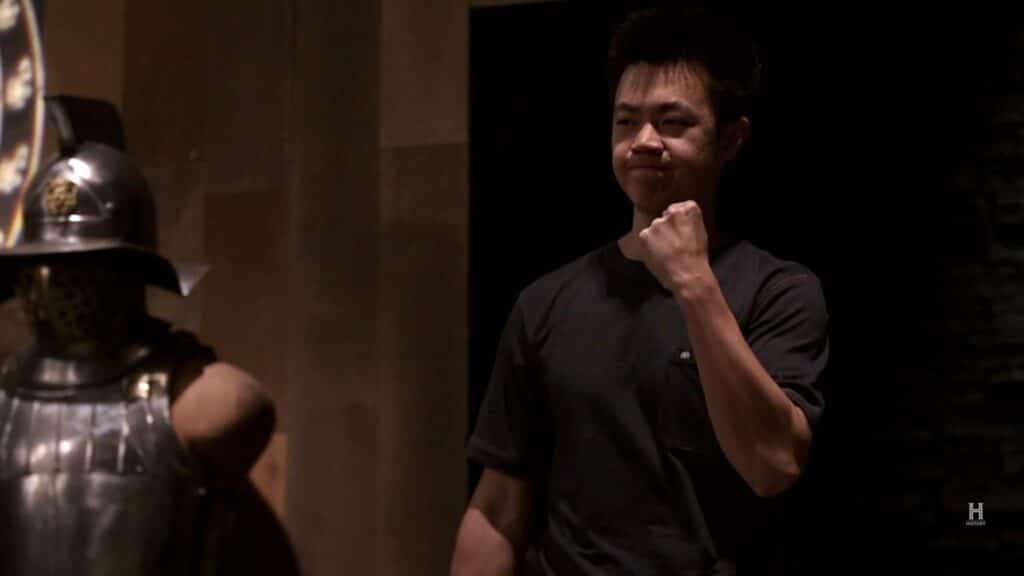
You mentioned BASIS, and a little about time management. Overall, how would you say that BASIS Charter Schools prepared you for this?
Hu: One of the things that I learned at BASIS was how to do things efficiently. I am not going to say that I had really good time management, or that I have really good time management now (laughs). But when I was at BASIS, I would find a way to finish those [projects and assignments] as fast as I could. That is directly applicable to the show. In terms of making the blades, I had to do all of that learning outside of class, because obviously BASIS doesn’t have a blacksmithing class (laughs). The academic pressure helped me adapt to the competition. A lot of people do worse under pressure, and if you do that at BASIS you flunk out.
What was your favorite weapon to make?
Hu: I have to say the last one, the Dolabra, a pick axe combo that the Romans used as a weapon and a tool. It was like a homecoming for me. All the stuff you saw me do on the show was the first time I ever did it. I was learning while making those weapons. Having done seven different weapons in seven different styles, I melded all that learning for the last one. It was like proving to myself that I was coming out of there a better smith. Second place would be the pair of daggers, because I think they just look cool. They had 17-part handles and I had to make two of them! (laughs).
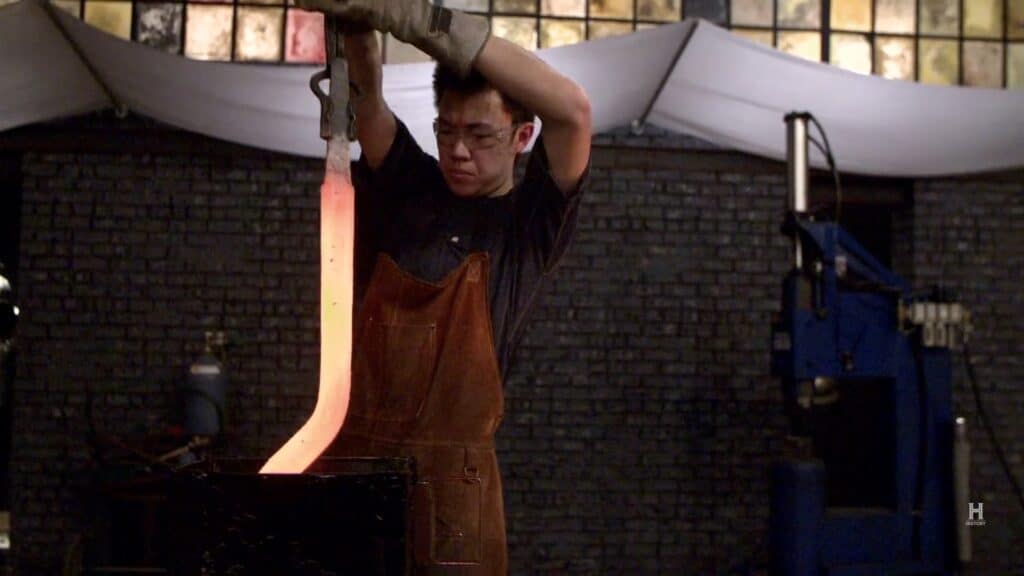
Did you have to do any research about the weapons since they are historical? Did you know what they were?
Hu: I could make the weapon without knowing the historical significance. It’s not really 100% necessary to build the blade itself. There are small nuances in weapons that definitely do matter. When I was making the Xiphos, which is a Greek shortsword, my opponent put the hump too close to his tip and I put mine where it was supposed to be. In doing so, my blade had better balance than his. Knowing what the blade looked like would have helped.
I want to ask a couple of general questions about your BASIS experience and get a little insight. Do you have a favorite memory of BASIS Chandler?
Hu: One of the things I really enjoyed was rising to the top in the grades. As you go through school, you become the top dog. I enjoyed growing up with people in my grade. I was big into sports at BASIS, and I really liked the mentoring aspect. Also, a math teacher at BASIS ran an obstacle course racing club. We did Spartan races and being part of that club was one of the things that gave me the most joy. It was super tough, and you would want to throw up at the end of them but doing that with friends outside of school was cool.
Did you have any favorite classes that you took?
Hu: I really loved fifth grade classics, and I liked my senior Art of Approximation class. You learn to approximate big things with as little information as possible using a combination of your intuition and how things work in general.
Was that a capstone?
Hu: It was a Senior Capstone. That was super dope. I was also in strings my entire time there. I also played cello as early as I could, and I was always the leader of the cello section, so I really liked that class. I loved all…well, most of the conductors (laughs).
I am going to give you a little fill-in-the-blank. BASIS is…
Hu: You are putting me on the spot here (laughs).
Looking back from where you are now, knowing you got through it, what do you think now?
Hu: BASIS is foundational. Everybody who comes out of BASIS is better than the average student elsewhere. They have seen tougher stuff and been through tougher stuff.
Do you have any advice for a younger BASIS Charter School student who might read this? Think of that version of you. What would you say to that kid?
Hu: Most kids at BASIS take themselves too seriously. They need to balance the importance of getting good grades and living life. I always tell myself this, if you can’t do anything about it now why stress about it? Stuff happens. Don’t forget to do what you love outside of school. If I didn’t turn my entire backyard black with charcoal, I wouldn’t have gotten anywhere close to the opportunity of being on the show.
Stoic philosophy…good! That’s a great thing to tell a BASIS student. So, you are at the University of Michigan studying engineering?
Hu: Yes, I was originally a tool and electrical/mechanical major, but I swapped out of mechanical, and am just taking upper-level mechanical classes with an electrical major.
Do you have any plans for what you want to do with that? I know that’s a tough question!
Hu: If there was a percentile of people that knew what they were going to do with their lives after college, I am probably in the 2 percentile or even 1.5 percentile. I am just going with the flow. If I plan out the next five or ten years and something happens where I can’t do any of that stuff, I wasted all that time planning for nothing. I have a general direction, but not anything exact. Something to do with my hands. Something to do with engineering or robotics. Nothing set in stone yet.
That makes sense, going with the flow! In regards to the ‘Forged in Fire’ show, is there any chance that you will be on it again?
Hu: So, I got a phone call in April, and they asked me if I was willing to eventually come back on. I said yes, if the timing was right, because I was away from school for an entire month taking 16, 17 credits of engineering at University of Michigan. That doesn’t mix well. It was a massive risk and it paid off, but if I go again it’s going to be during the summer…on my terms (laughs).
Do you have a plan for your business? Are you planning to scale up?
Hu: In the short term, I have taken a lot of cool commissions. I will enjoy making those next summer. I have a website and I am going to establish myself as a business this December with my dad. In terms of scaling up, I am assuming you mean recruiting people?
Things like growing your business beyond selling your weapons on your website.
Hu: I don’t see myself scaling it up like that anytime in the future. One of the things that gives me the most joy with this craft is that everything is done by me. If I have someone else doing it for me…I can’t put my name on that. Maybe sometime in the future if my name gets slightly bigger. I am working on building a YouTube channel, and I released two videos this summer. Next summer I am going to be blowing up the production budget and creating cool stuff. I am happy with this for now. I sort of made the mistake of trying to turn my hobby into a job too soon. I started getting stressed because of the commissions I was taking. No, no, no. That’s not going to happen again. I am doing what I want.
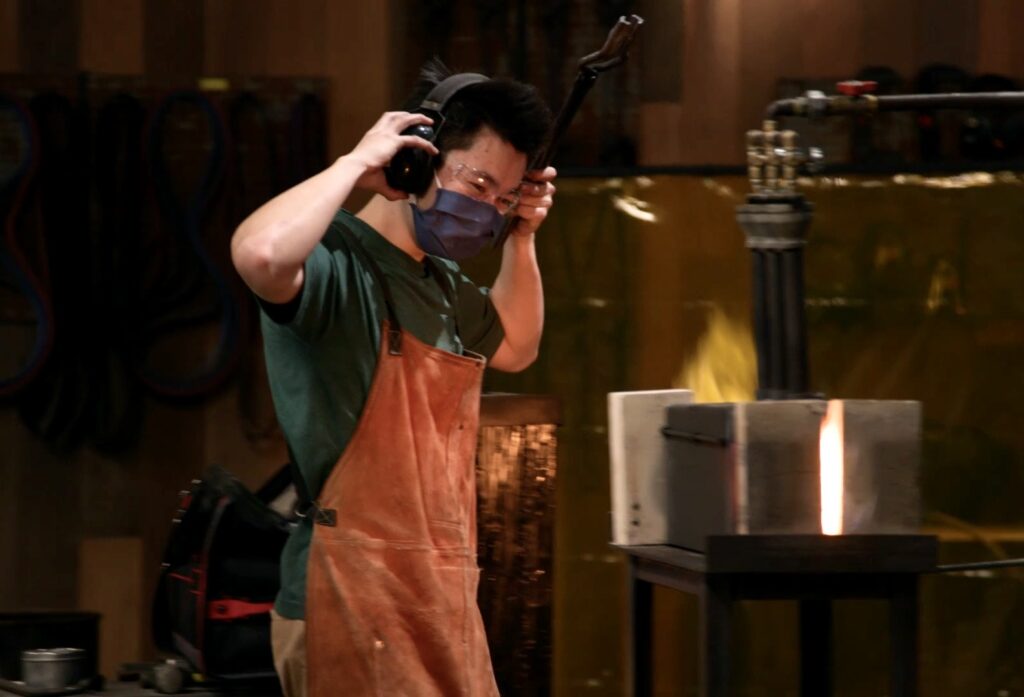
To learn more about Jesse Hu, or to commission work visit his website: www.jhublades.com.
Editor’s Note: “Forged in Fire” depicts weapons in action and may be too violent for some viewers.

